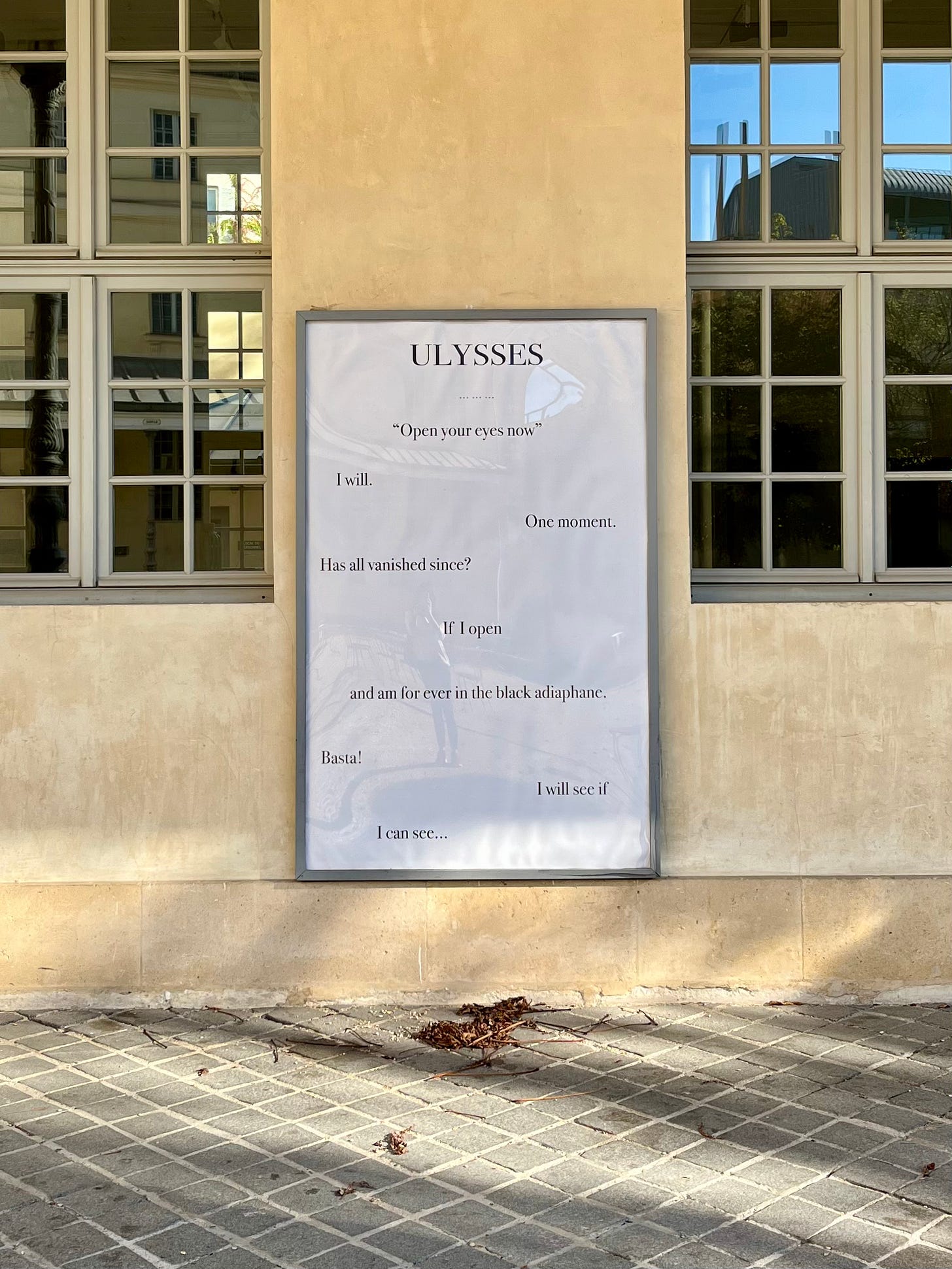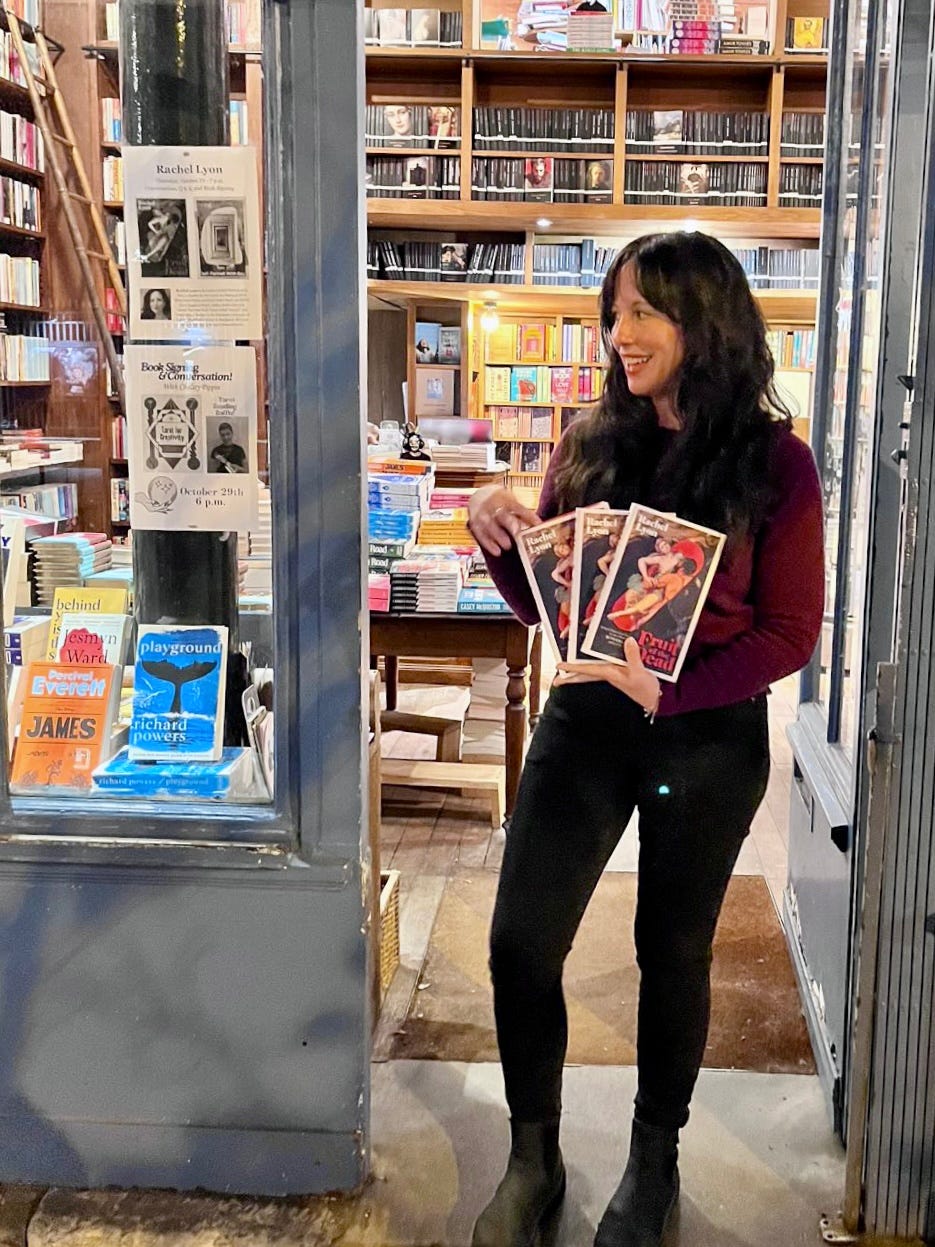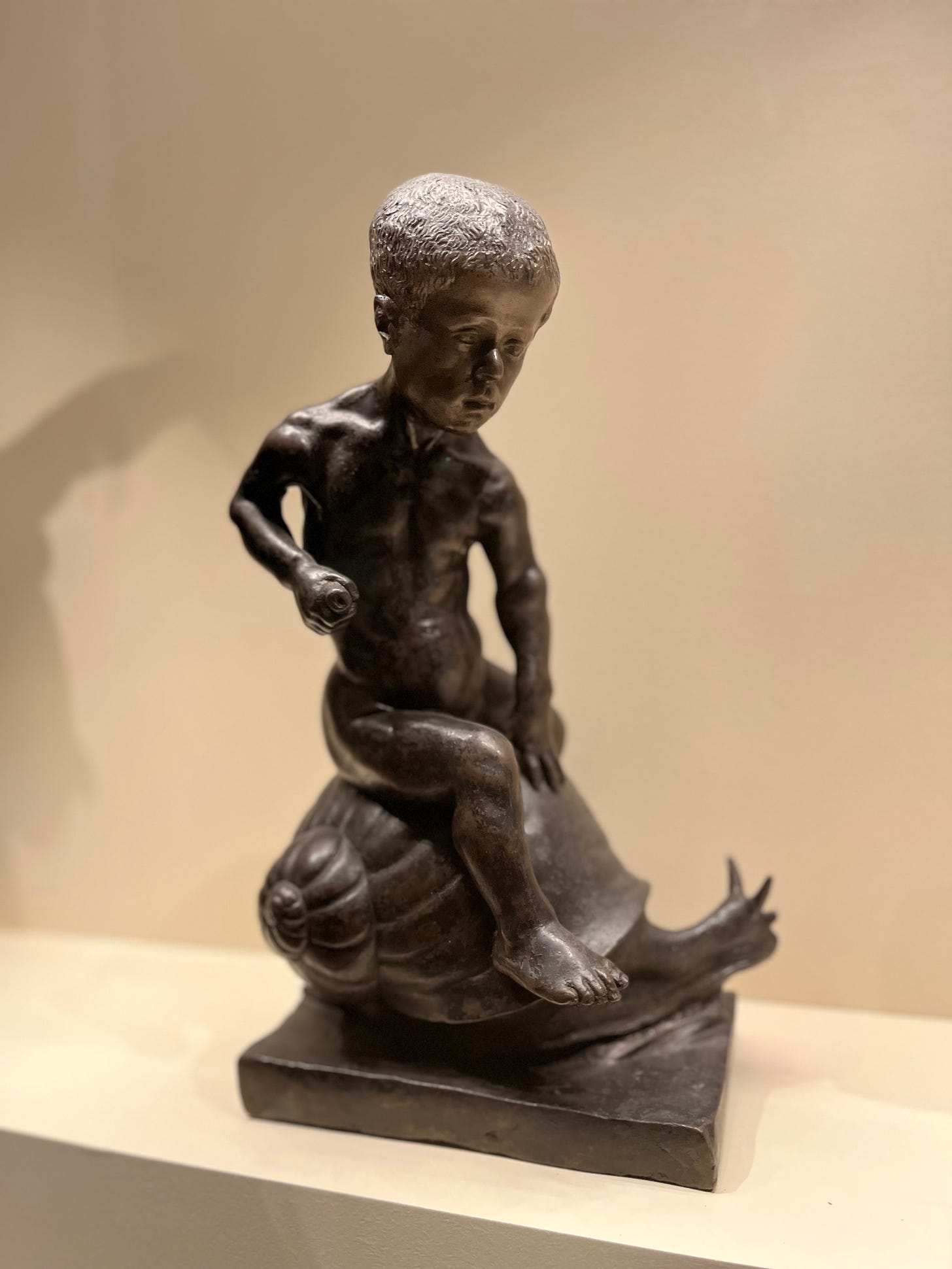Postcard from Paris
On Paris, the pros and cons of measuring progress quantitatively, writing daily, the question of "Influence," and one small, concerned gnome on a snail.
For the past month—with the exception of a long weekend in the middle, when I went home to New York for a wedding and a birthday party and to squeeze and kiss the husband and kids—I have been in Paris. Thanks to a monthlong residency through the American University I have been living at the Irish Cultural Center, a lovely old building with big beautiful casement windows looking out on a broad gravel courtyard with trees pruned in the European style and little round red tables and folding chairs. The weather was cold and wet for the first couple of weeks, which was discouraging vis-a-vis walking around Paris in sneakers, but beneficial vis-a-vis productivity. In this, my last week, however, it’s been gorgeous, blue and crisp and warm enough in the sun that I could spend a long time, for instance, writing down there in the courtyard, in a tee shirt, getting sunburnt beside this poster-sized quotation from Ulysses which hangs, framed, on one exterior wall:
Sunday I will fly home to my kids, to the spooky/gorgeous apotheosis of Halloween in New England, and the tremendous anxiety of Election Day. I have been thinking a lot—you probably have, too—about the election: our responsibilities as voters nationally and internationally; the possibility (responsibility?) of taking seriously both some major betrayal by, faithlessness in, and cynicism about our country’s leadership, in light of the unthinkable and ceaseless atrocities in Gaza and, now, Lebanon, and, simultaneously, a degree of hope and dedication to the democratic process, despite everything.
But you really don’t need to hear any of that from me, an adequately informed middle-class white American fiction writer. You’re getting it, we all are, from all sides. All I will say is that my four-year-old son’s preschool is closed on 11/5, so I’m looking forward to bringing him with me to our local polling station, and to talking with him about the democratic process in the hopeful, honest, G-rated way we talk about things together. I hope (pray?) that he will remember helping to vote in our first woman President.
For today, though—and for the sake of this newsletter, which is, you know, about writing—I am still here in Paris, missing my children but having, in a meaningful way, returned to myself, as an artist and an individual, through a lot of just exquisite time alone, and fun with old and new friends, and writing, and doing a few great events, and having, overall, a lovely time.
For my own reasons, neurotic and otherwise, I’ve been measuring progress on my third book mostly quantitatively, recording the number of words that have made it from my brain to the digital page each day. And I have to say: to look at those numbers in a vacuum is to deduce that I have made objective and significant progress! One day at a time, I have written more than 26,000 words this month, triple the number of words I managed over the course of the entire summer. My manuscript is now over the 300-page mark, which is already longer than my whole second book—and it’s not done yet, but, you know, it is the length of a novel! Compiled into a Word doc, it looks like a novel! It is made up of chapters which are made up of sub-sections which are made up of paragraphs made up of sentences made up of those very 26,000 words!
I am proud of having made meaningful progress on the project, but I am also wary. Just because it is looking more like a novel and less like a jumble of disorganized paragraphs and bracketed [[tbd]]s does not mean it is necessarily closer to becoming a book. Art is of course immeasurable. Once complete, it can be evaluated only qualitatively, and prior to completion it is subject to any number of unpredictable external forces, from its author’s whims and revelations to feedback from or inspiring conversations with friends to, for instance, a month in another country, or becoming a parent. In other words I am aware that, no matter how obsessively I record my daily word count, it simply will not tell me whether the book is any good, nor what it requires to move in a goodly direction.
At home, I usually do not manage to write every day, and during periods when I do, the number of words I manage to get down is usually in the hundreds, not the thousands. 200, 500, 700, something like that. Usually, on a good week, I sit down to write twice in a week—three times, tops—and during those days when I don’t manage to write, I feel like my creative energy gets stored up and replenished, so that when I do get a chance to sit down and write, I have a lot more to say and a lot more energy with which to say it. Sometimes I mull over a scene for a week and a half before I sit down to write it—and then, I’ve already worked out some of the kinks and confusions, so it really flows. Writing every day, as I have here, has meant writing even when the spirit has not moved me. It has meant a lot of getting up from my desk and going down to the courtyard, and taking long breaks to walk or nap or read, and consuming lots of other art (see below). It has meant rereading some of the stuff I wrote a day earlier, then rereading some stuff I wrote months ago, and realizing, rather thickly, then realizing again, that more words does not necessarily mean better words.
However, if I feel somewhat stupider and uninspired, now and then, day to day, on a micro level, on a macro-level I feel more in tune with the project, more sure of its structure, its premise, its internal dynamics, its overall feel. Living in it every day has made me aware of certain patterns and undercurrents which remained unconscious, unnoticed, during the time when I was only visiting it every now and then.
Unlike my first two books, the first of which takes place over the course of one year, the second of which elapses over just one summer, this third novel unfolds over the course of forty-two years—backward. In part because, in working on it, I have been dipping in and out of different sections, which occur during different time periods, in part simply because I’m still working on the first draft, I have gotten to know my characters the way you might get to know your cousins, say, or a friend who lives too far away to see very often: in brief if sometimes telling moments, over half a lifetime.
But here is another thing that writing every day has done for me: after a month of visiting them daily, I’ve begun to feel as if these characters are not merely acquaintances. I’m not sure how to put what they do feel like; I want to say that they are me, but they are definitely not me. They are something like dear, real neighbors, walking next to me, with pasts and futures and distinctive qualities that have evolved over time and will continue to. They are also complex, embodied roles which I am increasingly compelled and able to duck into, to inhabit.
Incidentally, by now you may already have heard The New York Times’s Interview podcast with Sally Rooney. (Caroline Hagood recently had a few smart and critical things to say about it.) Whatever your take on Noted Male Interviewer David Marchese, Rooney talks about what she does as being similar to acting, say: she has this experience of inhabiting the roles of her characters, and also she feels like they are her friends. I think I feel the same way, and I sort of wonder whether it has to do with being a specifically dialogue-oriented writer, a kind of acty writer, which I’d say Rooney is, and which I probably am, too.
Rooney is among the artists I’ve read and absorbed during these weeks in Paris; it felt appropriate, as I’ve been staying at the Irish Cultural Center, among all these Irish visitors, to read her. I’ll spare you my hot (lukewarm?) take, since the literary world is already oversaturated with Sally Rooney Discourse, and just tell you this one last anecdote. Tuesday night, I was lucky enough to get to be in conversation with luminous genius / novelist / Beckett scholar Amanda Dennis. During the Q&A at the end of the talk, one of the students in the audience asked a question about Influence. Do you read when you’re writing? she said. Because I read somewhere that some writers don’t like to be Influenced by other work while they’re working on a novel. It throws them off, changes their voice, etcetera. That sort of thing.
In answering this question I felt myself becoming very animated. I said something like, well, first of all, anybody tells you he doesn’t like to read while he’s writing is probably just . . . lazy? I mean, practically speaking, if you are a writer, and you don’t read while you’re writing, when do you read? Like, it can take five or six years to finish a novel? Do you wait, that whole time, and only then, finally, when you’re done with your manuscript, pick up one book? When do you start your next project? Are you reading approximately one single book by another person every twelve years? Like, life is too short? Not to read???
But, secondly, and less flippantly, my deep belief is that reading while you are working on a long-term project is one of the great joys of life. I am like a sieve in this way: whatever I read goes right through my brain and into my work—sometimes without the benefit, even, of any real analysis—sometimes without my even noticing. For days after finishing Conversations With Friends, for instance, I kept catching myself trying to Roonify my dialogue. Eventually I will go back and edit the stuff and reel it in, bring it back to myself, closer to the heart of the project I’m working on. But, for now, I think what’s happened is, I’ve actually just learned something from her, and been practicing it on the page. And how great is that, to have found another literary role model? How gloriously weird, that bizarre, parasocial instinct, to try to speak in the same emotional dialect as another writer you love?
Recommendations
I don’t usually do this because frankly when you’re raising small kids the stuff you end up reading and watching is (A) not nearly sufficient to warrant any kind of list and (B) often mindless junk and/or meant for children, BUT since I have been here for the month I’ve had the bandwidth to sit with and absorb a bunch of stuff, which I shall now share with you:
Speaking of reading while writing, on this episode of the Ezra Klein Show (that link is just an excerpt you can read) genius Zadie Smith talks a lot about her book The Fraud and how iPhone / social media technology is not morally neutral and books she’s read and the history of the novel in light of this kind of ecstatic history-flattening thing that seems to be happening with contemporary music. It’s completely fascinating. You could listen to it twelve times and still get something new out of everything she has to say.
Relatedly, in George Saunders’s very cute Substack community, somebody then quoted that Smith interview to Saunders and asked very ingenuously whether it was a good idea, as a writer, to take a suggestion Smith made in that Klein interview, in a rather off-the-cuff way, to study the novel as a form from the 1300s until today. The post is called “How Much Do We Have To Read To Have A Chance To Be Good?” and people have offered a bunch of recommendations in the comments for a syllabus of quote-unquote Great Books from 1300-the present you ought to get through if you want, as Smith suggests, to study the novel as an evolving form over time. My only quibble is, like, okay, but half those people suggest that Lincoln in the Bardo is the defining book of the 21st century, which, I love Saunders, but. No.
My second full day here, I went alone to a 2PM screening of The Outrun, which is so good, transcendent and raw—based on a memoir by Amy Liptrot about a young scientist (played in the film by Saoirse Ronan) in the early stages of recovery from alcoholism, and the violent beauty of the archipelago to which she exiles herself, the violently gorgeous Orkney Islands off the coast of Scotland. It was me and approximately eight French retirees. I tried not to cry too noisily.
I also watched this clever, claustrophobic, and in the end very moving film called His Three Daughters. I watched it initially because two of its three stars are actors I love, Elizabeth Olsen and Natasha Lyonne, but I ended up really invested and absorbed and kind of transported. Also: good dialogue.
As research I’ve been going to hear a bunch of live music. A friend introduced me to the drummer Tiss and his project Poor Boys: incredible. (Tiss’s father-in-law, who was sitting next to us, leaned over and informed us that Tiss is the greatest drummer of his generation. I am on board.)
I’ve gone to to a few manouche jazz shows: I saw Angelo DeBarre perform with Mathias Levy on violin; then I saw Mathias again with the stunning singer Norig. Tomorrow I’m going to see Mathias play with Pablo Murgier. Conveniently I fly home on Sunday so if Mathias takes out a restraining order on me I will already be far away enough to abide by it.
In addition to the aforementioned Rooney, I’ve read and can enthusiastically recommend Amanda Dennis’s brilliant novel-of-ideas Her Here, it’s wonderful, just as luminous and smart as she is.
Krystelle Bamford’s forthcoming debut Idle Grounds is a book I shall be blurbing shortly—and hopefully saying something more eloquent than, Oh my god, I’m obsessed with this book, it’s incredible, because I am, and it is.
On a quick lil trip to Belgium I read and appreciated David Szalay’s intelligent novella Turbulence as well as Kaveh Akbar’s stirring—I want to say revivifying?—poetry collection, Calling a Wolf a Wolf. It left me very hungry for Martyr!, which I plan to pick up in advance of the plane ride home.
I spent about five hours one day at this like, unbearably huge museum, you may have heard of it, The Louvre? It was cool. I’ll leave you with my favorite of all the objects I saw there, this worried-looking 16th century Florentine guy riding a snail. Please enjoy: Gnôme à l’escargot:
À bientôt,
Rachel
p.s. My One Story class is filling up but there may still be a couple spots left. Join us, if you are so inclined! It will be fun and warm and productive and just great overall, I think.






